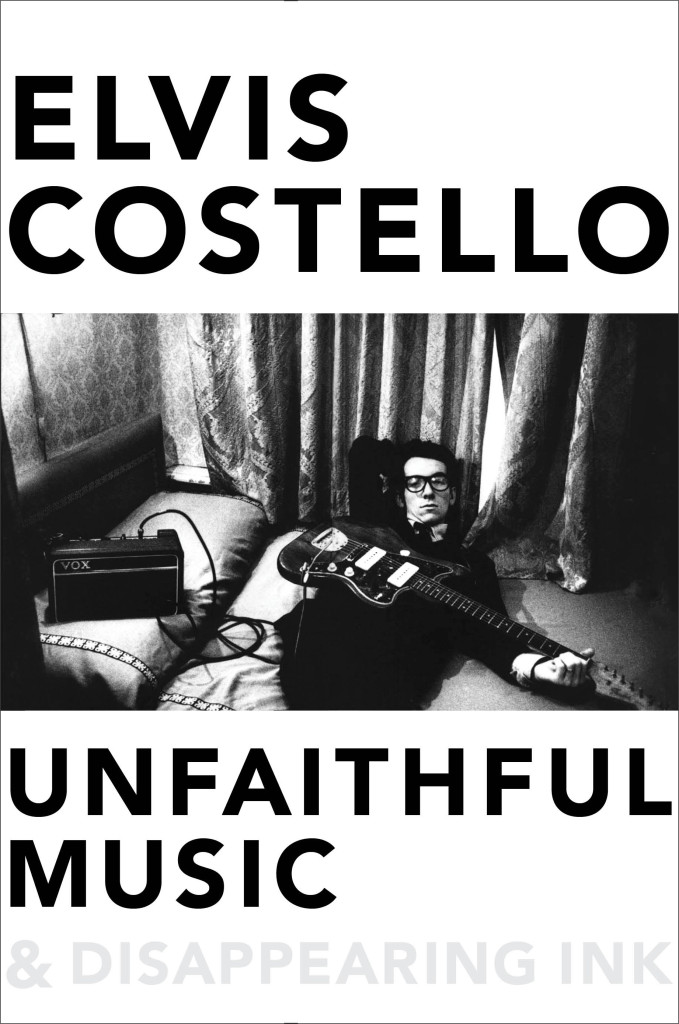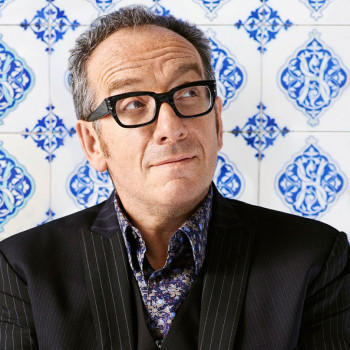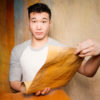Declan MacManus — a.k.a. Elvis Costello — has had one of the most fascinating careers of any pop musician. He rose to fame in the seventies with punky power pop hits like “Pump It Up” and “Watching The Detectives.” Then he started exploring everything from the Motown sound to country, jazz, classical and art music — in the process, collaborating with the biggest names in all those genres. Paul McCartney, Burt Bacharach, T Bone Burnett, Allen Toussaint… it’s a crazy list. Which explains why his new memoir, “Unfaithful Music and Disappearing Ink,” clocks in at around 650 pages.
In it, Elvis talks a lot about the music that shaped his tastes. So when Rico spoke to him this week, he asked the musician to start by reading a passage about his first exposure to the Beatles. Some background: Elvis’s dad was a singer in a U.K. dance hall band. And each week, music companies would send his dad fragile acetate records of new pop tunes… so he could learn to sing them.

Elvis Costello: [Reading:]“I never paid any attention to all the records my dad brought home until January 1963, when he was asked to learn ‘Please Please Me‘ by the Beatles.
From my room, I heard my dad playing this record over and over again, memorizing the descending cadence of the melody. To say it was thrilling and confusing doesn’t do it justice. I went into the living room and sat quietly on the couch. My dad usually didn’t like to be disturbed when he was working, but I suppose he could see my interest in this song was a little stronger than anything that he had registered before.
After the record ended, he lifted it off the turntable, put it back in the paper Parlophone sleeve, and dropped it on a pile of sheet music. I don’t know how I formed the words, exactly, but I asked if he needed ‘Please Please Me’ any more. He laughed, and he handed the record to me.”
And that’s exactly how it happened. I mean, you know, he was doing that week in, week out. I didn’t even register the other records.
Rico Gagliano: I have a record geek question for you. You had, I assume, multiple acetates of Beatles songs…
Elvis Costello: I still have them!
 Rico Gagliano: Oh thank God!
Rico Gagliano: Oh thank God!
Elvis Costello: There’s a picture of them in the book. I mean, I haven’t ever tried to play any of them in recent years because I don’t imagine the music is contained there [ed. note: acetates are known to disintegrate quickly, after only a few plays]. If it is, it’s probably very crackly, like a 78.
You know, there’d be a label glued onto the acetate that said… some of the acetates just say “Beatles.” They don’t even say “The Beatles,” you know. [Dismissively] “Oh, what’s that? Oh, it’s Beatles music. Just type that and the title of the song.” And that’s all!
You’ve got to remember the Beatles were on Parlophone, which was a comedy label. And not many people remark on that! Parlophone was a comedy label, it’s the label of Peter Sellers. So I’m not sure EMI knew what to do with the Beatles when they had them; they just shunted them off onto Parlophone. Probably thought, “They’ll have one hit. They’ve got a strange name…”
Rico Gagliano: Yeah; “They’re silly.”
Elvis Costello: Yeah, it was a little bit of that! And then everybody wanted to be on Parlophone, you know?
Rico Gagliano: Many years later, you became friends with Paul McCartney, obviously, when he was recording his album “Tug of War” down the hall from you where you were recording an album. At the time, did you look at it through the eyes of that kid who had been introduced to rock ‘n’ roll, in a way, through the Beatles?
Elvis Costello: You don’t really put yourself back at that age. You know, I was trying to be like, “I’m not going to be over-awed by this.” But of course! And then Paul’s kids ran into our studio, because they were just at Dad’s place of work, and they were tearing around the hallways and ran into our studio. Alice Cooper was in the middle studio. And then Duran Duran was there… It was really like a Fellini film!
Rico Gagliano: Yeah — there’s a question that we ask a lot of guests on this show, which is: “Tell us the best get-together you’ve ever been to.” Basically, every chapter of this book begins with what could be the best get-together you’ve ever been to. There’re chapters that just begin, “I was hanging out with Roy Orbison.” “I was hanging out with…”
Elvis Costello: Yeah. But no, come on now! I’m not just saying it just to mention their names.
Rico Gagliano: No, of course. It’s just amazing!
Elvis Costello: You know, I’ve actually been asked more about that Roy Orbison concert than anything else I’ve ever done, and I’m happy about that because it was a great night, tremendous thrill just to play the rhythm guitar behind him, much less that he sang a song I’d written for him…
Rico Gagliano: Yeah, of course.
Elvis Costello: But, all of these things, I generally just try to tell them as a taking-off point for: How the hell did I get there in the first place?
Rico Gagliano: Let me take a step back, actually. So, you hear the Beatles “Please Please Me,” but that’s not the song that convinces you to pick up a guitar and play it. That was a song, according to your book, called “Man of the World,” which is an early tune by Fleetwood Mac. It’s such a beautiful song.
Elvis Costello: Beautiful.
Rico Gagliano: What drew you to that song?
Elvis Costello: Well, I think when you’re — I don’t know what age — I was 14. Perfectly melancholy for that age. It was so beautiful the way he sang that. And I do love Peter Green, who’s probably my favorite guitar player, and…
Rico Gagliano: Who was then in Fleetwood Mac.
Elvis Costello: …Yeah, and when you say Fleetwood Mac, of course, it conjures up a much different image to American listeners. But for us, this was this group.
Rico Gagliano: Yeah; pre-Stevie Nicks.
Elvis Costello: Yeah, quite a lot pre. In the late ’60s, they wrote… they made these really extraordinary, very original-sounding records.
And I had never been moved to pick up the guitar. I had had one for a number of years, but something about this song made me persevere. I really worked at it because it’s — as you hear, it’s not easy. It’s not a three-chord trick.
Rico Gagliano: No, and it’s interesting because you say– in the same chapter that you talk about playing that song — that you couldn’t imagine, at that point, playing some other songs you really loved, which were Motown songs.
Elvis Costello: Or Beatles songs. Weirdly enough, I couldn’t play… I couldn’t imagine how you could actually make that sound come out of an instrument.
Rico Gagliano: But how is that possible? Because the song that we just heard is not easy.
Elvis Costello: Yeah, but it does start with one guitar. You know, the Motown songs sounded like orchestras to me. I was so shocked when I went, in the early 80s, to Hitsville, the original headquarters [of Motown]. And it was a tiny little single house, it seemed to me. And I had imagined the studio, in my dream, was a cathedral. Because that’s what it sounded like, with Levi Stubbs singing “Bernadette” or some song like that. You know, the reverb made it sound like this huge space, and there were strings and woodwinds on some of the songs, and somehow those records seemed beyond my imagining. They sounded human but, at the same time, they sounded superhuman.
And when they first came over, they came on the Friday night pop show, “Ready, Steady, Go!” which was the first really hip show on British TV. And I don’t even think they were singing live, I’m pretty certain they were lip-syncing… but their moves and the way they dressed was so thrilling, they made all the English groups look like they were wearing potato sacks, you know? Lumpy guys kind of like, jumping from foot to foot, and there’s Martha and the Vandellas, you know. It’s like… it was so incredible.
Rico Gagliano: Indeed. Well, eventually, you learn a lot more songs. You write a few of your own, and then in the ’70s, you become famous. Bang! It was that easy. In the book, you recall playing on tour with The Clash around 1977 —
Elvis Costello: Well, we weren’t “on tour.” We were just at a festival in Belgium.
Rico Gagliano: Oh, just…
Elvis Costello: Being “on tour” would flatter it, hugely. Really, “being drunk at a festival” would be a more accurate description.
I mean, I told the story, not to make myself look hip. I hate guys who: “Oh, hey, guys, I knew The Clash!” you know. But [I told it because] I think the story was so idiotic!
We went to this festival. We played — nobody could care less about us. The Clash played — people were throwing cans of beer at the security. And then we all ended up in a hotel room, and then this idiotic scene occurred where the other members of The Clash were teasing Joe…
Rico Gagliano: Joe Strummer.
Elvis Costello: …Because they’d spotted that we had a very slight physical resemblance. Like we could be distant cousins. And then when Joe put my glasses on, of course, that must’ve confirmed the suspicion that they had. They all just burst out laughing, you know.
And it’s such a… sort of a sweet memory, really. Because all the other things were all so furious… And some of it, sort of trumped up!
Rico Gagliano: Yeah, the punk rock scene at the time.
Elvis Costello: You have to say, in retrospect.
Rico Gagliano: Well, this is what I wanted to get at. You write that you were all just basically silly young people, until a journalist would approach you.
Elvis Costello: Oh, yeah, then you go into the script. Then you go into the act.
Rico Gagliano: Well, what was the script? What did the routine consist of, in 1977, for you?
Elvis Costello: Well, for me, it was — in those first interviews — I said a few things which, obviously, I couldn’t have calculated that they would make so many headlines.
Rico Gagliano: Like?
Elvis Costello: Yeah. Well, the first interview I went to, I’d had an attack of vertigo, and by the time I got there, I was just grumpy. And it came out as surly, and they romanticized it into, “This is his demeanor; he’s dangerous,” you know. And then, the next interview I did, I took the precaution of drinking 14 Pernods before I went to it, and so everything came out… you know, you’re exaggerating, and they goad you a bit more, and I’d say something else a bit more outrageous, and they’d like that, you know, so I’d say it again.
And then, after a while, it got convenient just to live by that script. Because then I wouldn’t have to answer anymore questions.
Rico Gagliano: Well, the good news is we’ve got just one more question for you, and then we’ll let you go.
Elvis Costello: Ah-ha!
Rico Gagliano: And it’s one of the questions we ask all our guests, which is: if we were to meet you at a dinner party, what question should we not ask you?
Elvis Costello: I really don’t… I don’t really think there’s anything that I would be…
Rico Gagliano: Well, let me float this by you. Would you mind if somebody asked you, “Could you sing the Secret Lemonade Drinker jingle?”
Elvis Costello: I could, but will I, is the question [laughs]! I was 17 when I did that, so that’s…I don’t have quite the same voice.
Rico Gagliano: This is my sneaky way of asking if you would…
Elvis Costello: Oh, you actually want me to do it! No, no, you’ll have to find the recording of that.
Rico Gagliano: Oh, we have it.
Elvis Costello: Oh, I’m sure you have it.
Rico Gagliano: Can we play it?
Elvis Costello: You should play it. I think it’s wonderful.
Rico Gagliano: You want to set this up for the people that almost certainly don’t know what this is?
Elvis Costello: So, my father, in the 1960s, aside from playing on the radio with a dance band, he would record jingles for advertising. And one of them, strangely enough, in 1973, was a lemonade commercial for a brand of lemonade that’s as popular and as well known in England as 7-Up is. And for whatever reason, the ad people decided that he was going to sing this jingle in an Elvis Presley voice, backed by what sounded like The Swinging Blue Jeans. Like a Merseybeat group fronted by Elvis Presley.
So, my father and I sang the name of the product, “R. White’s.” It’s the bizarrest session, but it was also my first professional session.
Rico Gagliano: All right, here it is: Elvis’s dad, Ross, with backing vocals by Elvis Costello in his first recording session.
Elvis Costello: And here’s the weird thing: once I started my career in 1977, and then a few months later they discovered I’d been on that recording… It was put back on the TV. Even though the ad looked a little funkier then. Ten years later, they revived it again. Then they re-shot the advert with different people – still used the same jingle!
Rico Gagliano: It’s inescapable.
Elvis Costello: Yeah.
Rico Gagliano: Elvis Costello, thank you so much for joining us today, and for sharing some of your life with us.
Elvis Costello: Thank you.


